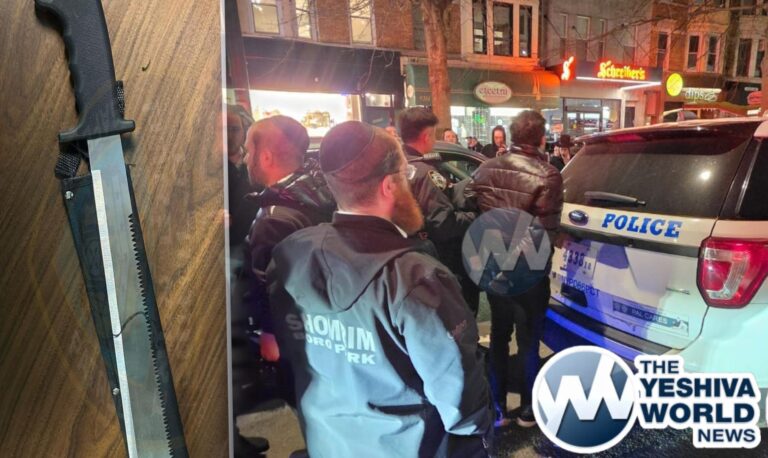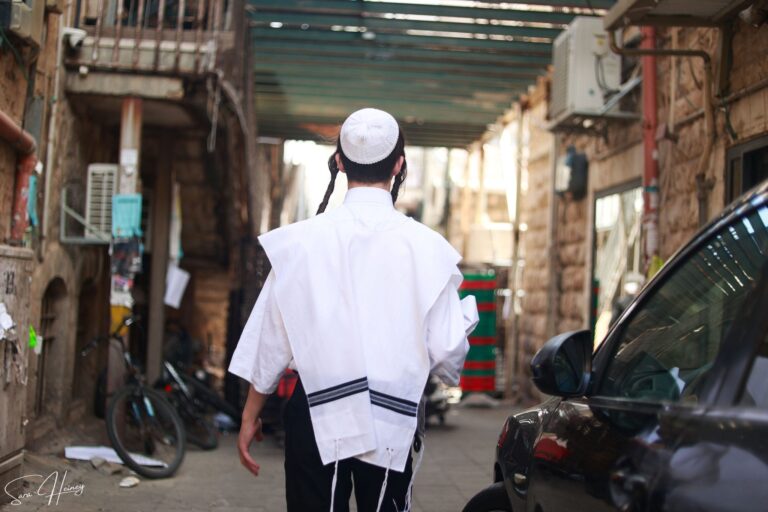 10:53AM IL: Police and other forces are preparing to complete the eviction from Amona. At this time, an estimated 60-to-100 youths are believed holed up in the community shul, the largest permanent structure in the community.
10:53AM IL: Police and other forces are preparing to complete the eviction from Amona. At this time, an estimated 60-to-100 youths are believed holed up in the community shul, the largest permanent structure in the community.
For now, police are playing a waiting game, but clearly this will not go on indefinitely and if the holdouts do not agree to leave, police will move in and force will be used. There are also a smaller number of people held up in a home.
For the time being, police are still clothed in sweatshirts and caps, sending a message of calm. No one is wearing helmets or body armor and weapons are not visible.
The people holed up in the shul and caravan are not residents of the community, but youths who came to do just what they are doing.
There are reports that youths were beaten by police once taken to awaiting buses.
A police spokesman reports 24 policemen were injured since the start of the expulsion. 800 youths were taken out and distanced from the site. 13 persons were arrested, primarily for disturbing the peace, assaulting police and interfering with police.
Police on Thursday morning were wearing protective glasses on their eyes after some were injured on Wednesday as bleach was thrown at them.
(YWN – Israel Desk, Jerusalem)











15 Responses
Per my son who was there, the police are not being gentle at all. He and the boys he was with sat down and linked arms, but did not in any way attack the police. That did not prevent the police from kicking him, breaking his glasses, twisting his fingers (once they picked him up), and threatening to break his arm. Nothing like the violence of ten years ago, but still not pleasant.
I’m proud of my son standing up for what he believes, and even prouder of the fact that he did not react by striking back when roughed up – the point was not to attack Jewish soldiers or police. We are all brothers, even when we disagree.
an Israeli Yid
What is the difference between the German Storm Troopers who destroyed shuls in the 1930s and the Israeli Yassam Troopers who are destroying the Shul in Amona today? Each group acted / are acting in accordance with the law of the state and in accordance with orders.
Why don’t we hear from anyone about the huge chillul Hashem Israel is causing with this new expulsion of Jews from the Jewish homeland? Hasn’t Israel learned anything from all these expulsions? Haven’t public figures and ministers received enough personal sufferings because of their cruelty towards Jewish brethren? PM Sharon is an example of one who suffered for 8 long years and then died with a handful at his funeral because of his heartlessness towards Jews. Enough is enough! We must stick up for kovod Shamayim and kovod habriyus! And, no, it’s not Netanyahu’s fault. Netanyahu is nothing but the self-appointed judges-for-life-destroyers-of-Israel’s puppet. We must “expel” these judges run the country illegally and replace them democratically once and for all.
Then they wonder and protest the increase in anti-Semitism worldwide. It’s Israel’s racist expulsion of Jews and only Jews and making cities in the Jewish land judenrein that is causing anti-Semitism and intolerance towards Jews all over the world.
Well, they did not leave peacefully: 17 policemen have been injured. The people who attacked the police should be arrested and tried. Furthermore, if any of them were residents of Amona they should be excluded from any government plan to aid the residents of Amona.
Sima Batsheva – While I strongly disagree with what is happening in Amona – both with the decision to expel the residents and with the way it is being done – it is wrong to equate it to what the Nazis ym”sh did. In fact, it is ALWAYS wrong to equate Jews and Nazis, and doing so only serves to discredit any other points by those making the comparison.
an Israeli Yid
#5- The residents of Amona are not being expelled (which is a political act) they are being evicted as a consequence of losing their court case. It is the type of legal action that occurs daily all around the world, including in the USA. As for the manner of the eviction: that is entirely the fault of the people who chose to violently oppose and attack the police who were doing their duty (and this, no less, after the residents of Amona agreed to the eviction as part of a settlement agreement). Try throwing stones in the USA at a sheriff enforcing a court order of eviction and see what happens. Do I wish that the court had found for the residents of Amona? – Yes, of course. But having lost there case their behavior has been absolutely disgraceful.
#4 Neither would you leave peacefully had you been expelled from your home JUST BECAUSE you’re a Jew. You’d protest and scream RACISM! Why doesn’t it bother you that Thousands of Arabs are living in illegal homes in OUR LAND and are never expelled?
The policemen being injured is their own fault. They act like kapos with iron fists again their own brethren, they deserve what they got. They’re a disgrace to humanity and to Hashem.
#5 – I asked what the difference is. You have not answered the question, just trotted out the “don’t compare line”. Please explain to me what the difference is. If you don’t like the question let me put it a different way. What would the Israeli government be saying if German troops today sacked a synagogue and forcibly evicted Jews before beating them up?
#6 You’re 100% wrong! They’re not evicted. They’re EXPELLED like the Jews who were EXPELLED in Spain. It is 100% a political RACIST ACT ONLY AGAINST JEWS! Had it been a disaster it would be an eviction. THIS IS AN EXPULSION of Jews. There has never been a judenrein in the USA. Get your facts straight.
#6 Yagel – This is absolutely a political act, carried out based on the decision of a Supreme Court with a political agenda. If you actually go through the legalities of the case, you’ll note that the Arab claim is based on a Jordanian land grant of previously public property. As Jordan was never a recognized sovereign power in the area, and in fact had less of a claim to it than Israel does, the decision in favor of Yesh Din acting on behalf of the unknown Arab owners (who only asserted ownership after being urged to do so by Yesh Din) was clearly political. There were any number of legal grounds for the decision to go the other way – the illegitimacy of the original grants, the fact that the specific owner was unknown (so a lack of standing to even go to court), and even adverse possession would have been enough to allow Amona to remain – but the Israeli Supreme Court, in an ideologically-driven decision, decided that these Jews had to be expelled.
As to the settlement deal – you may not be aware of it, but yesterday, the Supreme Court struck again. They ruled that the land to be used for the “new” Amona was ALSO “Arab-owned” land, and therefore blocked the Israeli government from building there. And, an additional point – even prior to this ruling, the Israeli government had made no moves on the ground to build the promised housing, even though the move date was supposed to be 8 February – so there’s no way that the property would have been ready by the time specified in the agreement. If one side doesn’t keep to an agreement, it’s kind of unfair to hold the other to it, no?
As to the behavior of the residents and protesters at Amona – I agree that those who threw rocks and physically attacked police officers should face the full force of the law. However, those who protested this injustice peacefully are praiseworthy – and I am proud to count my son amongst them. Sometimes, even if you know you’ll lose this time, it’s important to stand up for what’s right.
an Israeli Yid
#8 Sima Batsheva – Your original question was clearly rhetorical, and I responded to the false equivalence you expressed.
As to the differences – I have yet to see the Israeli police – even those who were unnecessarily violent – trying to kill Jews who wandered across their path. I have yet to see Israeli police attacking synagogues because they are synagogues, and Jews because they are Jews. I clearly disagree with what the Israeli police did, but equating them to Nazis – as you most certainly did with your “question” – is unnecessary and uncalled for.
They were wrong, but they are not – by any stretch of the most fevered imagination – analogous to German storm troopers.
an Israeli Yid
#10- While I sympathize with you I respectfully disagree:
A. Is the eviction a political act: Whatever the motivation of the court (which I will touch on next) the eviction is being carried out by the executive branch, not the judicial branch. Israel is a state that abides by the rule of law which means that the executive branch upholds and enforces judicial rulings whether they like them or agree with them or not. There is no indication that the executive branch has any political desire to evict the residents of Amona and a great deal of evidence that suggests that it dislikes and disagrees with the decision. So I must maintain that the eviction is not a political act.
B. Was the court swayed by political considerations? Perhaps: the left wing bias of the majority of the Justices of the Israeli Supreme Court is well documented and it is reasonable to speculate that that fact might have influenced the decision in this case. But I don’t think that that was the only factor working against the residents of Amona. First (and perhaps foremost) is the fact that for historical reasons the case came before the Supreme Court as a court of first instance in its role of Baga”tz. And for historical reasons, the procedure before Baga”tz allows for very limited presentation of evidence. While I have not read the pleadings in this case it is very possible that the limited evidence before the court would favor the petitioners. (It is high time that such cases were removed from the purview of Baga”tz which is ill equipped to deal with them). [As to both the legality of a Jordanian land grant in Yehuda veShomron and the adverse possession argument under current Israeli law – I believe that you are mistaken but this is not the forum for such a technical legal discussion].
C. The settlement agreement: yes, I heard. 2 to 1 with Justice Hendel dissenting. A shame but no doubt the government will find a new location. As for breach by the government: I admit that I have not read the settlement agreement but it beggars belief that ground was to have been broken and a new settlement built by February 8th.
D. Protest: I mean no disrespect to you or to your son but I believe that you are both wrong . Had this been a political act of expulsion then I would endorse your position without reservation. I might even understand the peaceful non-disruptive protesting of a legal eviction. But once it became apparent that a significant number of the protesters were going to be disruptive and violent – your son should have left. Oy larasha ve’oy lishcheno.
#12 Yagel – First, I want to say that I appreciate your civil tone, though not necessarily what you are saying – which I continue to disagree with. Specifically with respect to each of your points:
A. I agree that the government did not want to carry out the expulsion, and do not consider it a “political act” as such on their part. I do, however, consider the Supreme Court in Israel to be a political entity, and it was most certainly a political act on their part. Therefore, I continue to believe that the term expulsion is the correct one.
B. The court was absolutely swayed by their political worldview – there’s no “perhaps” about it. Even the recourse of Yesh Din to the courts is based on the political decision by former Chief Justice Aharon Barak, who essentially threw out the concept of “standing” that is generally considered necessary to bring a case – and the subsequent heads of the Supreme Court have been loath to re-introduce this concept as it would limit their ability to essentially rule by fiat. So yes, the court’s ruling was absolutely political.
C. The ruling by the Supreme Court essentially made the agreement moot, as the government was no longer able to fulfill its side of the deal – which was to keep the majority of the families on the same hill. As such, the residents were no longer bound by the deal either, and were free to protest. As to whether the government could have built the “new” Amona by 8 February – remember, we’re talking about CARAVANS here, not permanent housing. Given that the agreement was reached several weeks ago, it’s pretty clear that they could have. Also, remember – the move date under the agreement was supposed to be 8 February, and the Supreme Court only issued its ruling yesterday – so the fact that the government decided to carry out the expulsion yesterday was a clear breach of the agreement.
D. The vast majority of the protesters were peaceful, and until today, when they evacuated the Shul, there were very few incidents, and those that did happen were immediately condemned by the families and others present. My son arrived two days ago, and stayed in a family’s home the entire time until carried out at about 4:00 AM this morning – well before the Yasamnikim broke into the Shul. So, no, it never “became apparent that a significant number of protesters were going to be disruptive and violent” – else, my son’s Rosh Yeshiva would never have sent him and his friends there, or would have told them to leave.
an Israeli Yid
#13- First of all, Glad to hear about your son. I’m not sure what the doctrine of ‘standing’ has to do with it: even by the strictest, narrowest definition, the petitioners in this case would be deemed to have ‘standing’ as the (claimed) rightful owners of the property. Allow me to refer you to the famous ‘Beit El’ case in which Palestinian landowners successfully petitioned Baga”tz – in 1978, years before Justice Barak started to develope his doctrine of broadening ‘standing’. But even if the petitioners owe something to Justice Barak’s doctrine of broadening ‘standing’, that hardly makes the eviction or even the court’s ruling political. As for the rest, well, let’s just agree to continue to agreeably disagree.
#14 Yagel – Standing is a key issue here, as it’s not specific purported owners who brought the claim, but Yesh Din on behalf of a supposed group, at least one of which might be the owner. If you’ll look at Arutz 7’s website, there’s a specific article on a proposed new Basic Law to limit the right of the Supreme Court to review cases, and one of the key points made is the issue of standing and how under current Israeli jurisprudence, anyone can effectively petition the courts about anything, even with no standing.
And the Aharon Barak’s expansion of the concept of standing was specifically intended to empower the courts to impose their (generally leftist) views at will – so yes, by getting involved in something they should not have even been considering, the court’s actions are most certainly political.
I think we’ve essentially discussed this as far as we can, and I understand – but disagree – with your expressed views on this issue, and believe you feel the same about mine. I think the one thing we can both agree on is that we appreciate that this was conducted in a completely civil tone.
In any case, a Shabbat Shalom to you, and hopefully, this will be the last time we have to discuss the removal of Jews from their homes.
an Israeli Yid